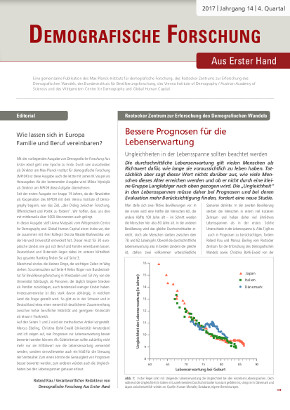December 18, 2017 | Defo News
Improving life expectancy projections

© MPIDR
The new issue (Nr. 4/2017) of Demografische Forschung Aus Erster Hand, the popular science newsletter with latest research results from demography, has been released. (The Newsletter is available in German only.)
Topics of the 4/2017 issue:
1. Improving life expectancy projections
Inequalities in life span should be taken into account
Many people see average life expectancy as an indicator of how long they have to live. In reality, however, this figure tells us nothing about how many people will actually reach this age, or about whether this value is pulled upward by a small group of long-living individuals. Thus, a new study has called for taking the role of life span “inequality” into account in life expectancy projections, and in evaluations of these forecasts.
2. Career and family: Where do they go well together?
A new index on the compatibility of work and family shows large differences across Europe
As expected, the index shows that the Scandinavian countries perform best; while Portugal, the country that performs worst, has less than one-third of the points of the top-scoring country. A new study presents the findings of this index, which examines the family policy conditions, the labor market structures, and the social norms of 30 European countries.
3. Does having a long commute mean having fewer children?
Work-related mobility and family are easier to reconcile in France and Spain than in Germany and Switzerland
People who commute long distances or travel frequently for work have less time to spend with their families. In Germany and Switzerland, women – and, to a lesser extent, men – who spend a lot of time commuting or traveling for work have fewer children on average. In Spain and France, by contrast, almost no association is found between work-related mobility and family size.
"Demografische Forschung Aus Erster Hand" is a joint publication of the Max Planck Institute for demographic Research (MPIDR), the Rostocker Zentrum zur Erforschung des Demografischen Wandels (RZ), the Vienna Institute of Demography (VID), the Wittgenstein Centre for Demography and Global Human Capital and the Federal Institute for Population Research (BiB). The newsletter is released four times a year and is available electronically and as a printed version and is free of charge.
All past issues are available online on the Newsletter website. On the website you also have the possibility to subscribe to the Newsletter to get informed about the release of the new issues or to receive the printed versions by mail.